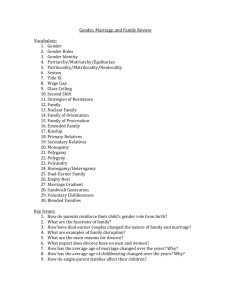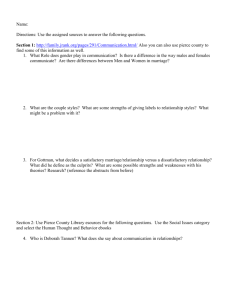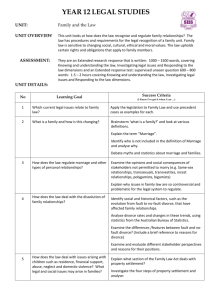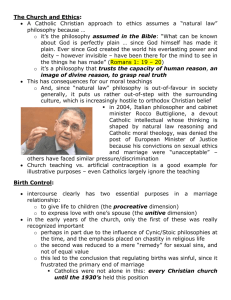Religion and human relationships Religion and human relationships
advertisement
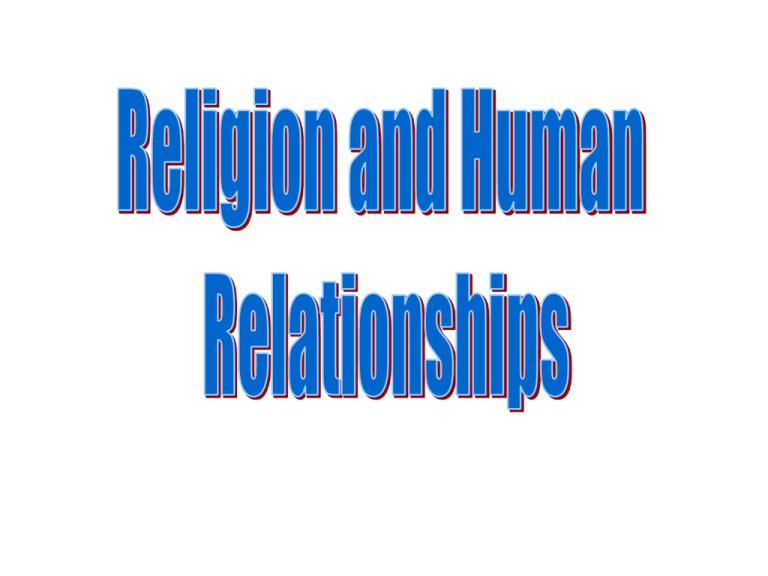
What did we study? Religion and human relationships Religion and human relationships Roles of men and women in the family Roles of men and women in a Christian family Roles of men and women in the Church family Marriage and marriage ceremonies Marriage ceremonies The ways in which the ceremonies reflect and emphasise Christian teaching about marriage Responses to civil partnerships Divorce Beliefs about the ethics of divorce Beliefs about the ethics of re-marriage Sexual relationships and contraception Beliefs about sexual relationships Beliefs about contraception Key words Adultery Annulment Civil partnership Cohabitation Commitment Contraception Divorce Pre-marital sex Promiscuity Re-marriage Sacrament Vows Key words Definitions Adultery A married person having a sexual relationship with someone to whom they are not married. Annulment A marriage terminated by the Church because it was not valid. Civil partnership Legal recognition of a same-sex relationship with a registry office ceremony. Cohabitation To live together, especially without being formally married. Commitment A bond between a couple. Contraception The prevention of pregnancy by using artificial or natural methods. Divorce The legal ending of a marriage. Pre-marital sex Having a sexual relationship before marriage. Promiscuity Having many sexual partners without commitment. Re-marriage Marrying again after divorce. Also after annulment or widowhood. Sacrament A special action which brings Christians closer to God. Vows Sacred promises a couple make at their marriage. “Then the Lord God made a woman from the rib he had taken out of the man.” (Genesis 2:22) Some Christians believe that the role of men is more important than the role of women, who are intended to be men’s helpers. “I do not permit a woman to teach or to have authority over a man; she must be silent. For Adam was formed first and then Eve.” (1Timothy 2:12-13) The Bible seems to teach that women should not be allowed to speak in church, or be teachers and leaders. “Wives … be submissive to your husbands … Husbands, in the same way be considerate as you live with your wives, and treat them with respect as the weaker partner.” (1 Peter 3:1,7) Some Christians believe that women are weaker and more likely to sin than men, because in the Bible Eve sinned first and tempted Adam to copy her. “Wives, submit to your husbands as to the Lord. For the husband is the head of the wife as Christ is the head of the church.” (Ephesians 5:22-23) “There is neither Jew nor Greek, slave nor free, male nor female, for you are all one in Christ Jesus.” “…what God has joined together, let man not separate.” (Galatians 3: 26-28) Paul taught that men and women are equal in Christ. “…anyone who divorces his wife, except for marital unfaithfulness, causes her to be an adulteress.” (Matthew 5:32) A Bible teaching against divorce. “For if you forgive men when they sin against you, your heavenly Father will also forgive you.” (Matthew 6:14) Christians believe it is important to accept that sometimes people make mistakes. “Do not judge, or you too will be judged.” (Matthew 7:1) Christians believe that while divorce is not ideal, it is not up to them to judge whether it is right or wrong for other people to get divorced. “Then the Lord God made a woman from the rib he had taken out of the man.” (Genesis 2:22) Some Christians believe that the role of men is more important than the role of women, who are intended to be men’s helpers. “I do not permit a woman to teach or to have authority over a man; she must be silent. For Adam was formed first and then Eve.” (1Timothy 2:12-13) The Bible seems to teach that women should not be allowed to speak in church, or be teachers and leaders. “Wives … be submissive to your husbands … Husbands, in the same way be considerate as you live with your wives, and treat them with respect as the weaker partner.” (1 Peter 3:1,7) Some Christians believe that women are weaker and more likely to sin than men, because in the Bible Eve sinned first and tempted Adam to copy her. “Wives, submit to your husbands as to the Lord. For the husband is the head of the wife as Christ is the head of the church.” (Ephesians 5:22-23) 6 March, 2011 Religion and human relationships Topics to revise: 1. Roles of men and women in the Christian and Church family 2. Marriage and marriage ceremonies 3. Christian responses to civil partnerships 4. Christian beliefs about divorce and remarriage 5. Christian beliefs about sexual relationships 6. Christian beliefs about contraception 1. Roles of men and women in the Christian and Church family There are still Christians, and Christian denominations, who believe that a woman should stay at home and care for the children and her husband. However, most people would probably take the view in Paul’s epistle (letter) to the Galatians that all Christians are equal whether male of female. •In the first creation story in Genesis it says ‘... God created man in his own image, in the image of God he created him; male and female he created them’. •In the second creation story in Genesis, man was created first and then woman was created as a companion and helpmate to man. Some Christians might use this story to argue that women have a lesser, or at least different, role to men. •In the Old Testament many women are seen as strong and important people rulers, e.g. Jael and the Queen of Sheba. •Jesus’ attitude towards women in the gospel accounts shows him treating women as equals. •In the New Testament there are examples of women such as Priscilla and Lydia who appear to be in positions of authority within the early Church. •The first female Methodist minister was ordained in 1880. The Anglican Church ordained its first women priests in 1994 in Britain. •Neither the Roman Catholic nor Orthodox Churches allow women to be ordained. •The reasons given are that Jesus only chose men to be his disciples and at the Eucharist the priest represents Jesus. 2. Marriage and marriage ceremonies Marriage provides a relationship through which husband and wife support each other; this relationship is built on love and faithfulness. It also provides a secure environment for the bringing up of children. •Marriage is seen as a gift from God and part of God’s plan for creation. •The importance of marriage is stressed by Jesus: ‘Therefore what God has joined together, let man not separate’ and these words are stated in the marriage ceremony. •The words of the marriage ceremony stress that the promises of the bride and groom are made before God. • At the beginning of the service the priest or minister reminds the couple of the seriousness of marriage. They are told that it symbolises the relationship between Christ and the Church and that a marriage was the occasion of Jesus’ first miracle. • The couple answers these vows: Will you love her/him, comfort her/him, honour and protest him/her, and, forsaking all others, be faithful to her/him as long as you both shall live? • They promise that they will stay together: for better, for worse, for richer, for poorer, in sickness and in health, to love and to cherish, till death us do part; according to God’s holy law. • The couple may exchange rings. The circle represents eternity and their unending love for each other. •One of the most important aspects of a Christian marriage is that, for Roman Catholics and the Orthodox Church, it is regarded as a sacrament: an action that brings the couple closer to God. • In a Roman Catholic marriage the service is followed by a special Eucharist called a nuptial mass. The Christian Church believes that it is a sin for people to have sexual relations with each other unless they are married because of the vow to be faithful taken before God. Some Christians believe sexual relations before marriage also break the seventh commandment ‘do not commit adultery’. 3. Christian responses to civil partnerships The reaction of the Churches to civil partnerships is based on biblical teaching where it appears that homosexual activity is condemned in both the Old and New Testaments. Examples are the destruction of Sodom and Gomorrah and Paul’s teachings in 1 Corinthians. • In December 2005 civil partnerships became legal in the UK. • Civil partnership services are formal ceremonies for same-sex couples in which they make promises to each other and which gives them the same legal status as married heterosexual couples. 3. Christian responses to civil partnerships • Civil partnership ceremonies, by law, do not have any religious content to them. •The Roman Catholic Church and Church of England are opposed to civil partnerships because they teach that marriage is the proper place for sexual activity to occur and that one of the main purposes of sex should be to create a new life which homosexual sex cannot do. •The Roman Catholic Church sees homosexual activity as essentially being masturbation, which it believes is always wrong because it is misuse of the sexual genitalia and is seen as the sin of Onan. • The Methodist Church has always been open to discussion of homosexuality but states that it: ‘does not consider that homosexual genital practice [homosexual sex] ... is acceptable’. So although they accept a person as being homosexual they would condemn the person acting on homosexual instincts. The Church will not bless civil partnerships. • Only the Quakers fully accepts homosexual couples in their meetings. • Individual Christians may have quite different opinions to the Churches. They may feel that everyone is created in God’s image and that therefore they are equal and should be treated equally. 4. Christian beliefs about divorce and remarriage Christians see marriage as being for life and consider that the promises the couple made were to God as well as to each other. Because of this divorce is always viewed very seriously. However, Christians have different attitudes on the subject of divorce. • Divorce is not welcomed in the teachings of the Old Testament: o Moses taught that divorce was permitted if a man found out something indecent about his wife. o In Malachi, God says ‘I hate divorce’. • In the Sermon on the Mount, Jesus said that divorce was wrong and that the Old Testament rules about divorce were not strict enough. • Jesus said that adultery was grounds for divorce. • In 1981 the Church of England decided that although a person had been divorced this should not prevent them from marrying someone else in a church ceremony. • The Orthodox Church does allow divorce people to marry a second or third time. • The Roman Catholic Church accepts that people may get a divorce, which is a civil matter, but they are still seen as married because a sacrament cannot be undone. If they have a sexual relationship with another person or get married again in a civil ceremony they are not allowed to receive communion as what they are doing is seen as a sin. • In certain circumstances, the Pope may grant an annulment to a couple who wish to divorce. An annulment says that the original marriage was flawed and therefore did not actually take place. This only happens in certain circumstances: for example, if the couple were not mentally fit to understand the seriousness of marriage. Once an annulment has been granted the couple are free to marry again in church. 5. Christian beliefs about sexual relationships Even though many people now choose to live together in relationships without being married, this is not welcomed by the Christian Church. • Christianity teaches that the sexual act must take place exclusively within marriage. In Genesis 2:24 men and women are told to ‘become one flesh’. Outside of marriage sexual activity always constitutes a grave sin. • St Paul remained unmarried and appears to have thought that the ideal was for everyone to be celibate. This might have been because he believed people should not be diverted away from following Jesus. • Some scholars have suggested that Paul thought that Jesus’ return – the second coming or Parousia – would happen very soon and that people should stay celibate and wait for this. • In the Roman Catholic Church, priests are required to take a vow of celibacy as the Church believes that if a priest was married he would be distracted from loving and serving God. • Agape – is the unconditional love exemplified by Jesus’ sacrifice on the cross. It is given to everyone no matter who they are, what they have done or whether they return that love. • The Christian Churches are all opposed to adultery, fornication and, with few exceptions, homosexuality. They view all of these as going against the unitive and creative purpose of sex within marriage. Some Churches are prepared to allow cohabiting couples into their congregations but the majority will not. 6. Christian beliefs about contraception Christians believe that life is a gift from God and sacred, and that the purpose of sexual activity is to create new life. Because of this the Roman Catholic Church does not approve of artificial contraception. Some other Churches accept the use of artificial contraception in order to ensure children are planned and wanted. • Although there are no specific teachings within the Bible about contraception, Christians believe that life is a gift from God and sacred and therefore many of them feel that contraception (or birth control) is preventing a new life which God wishes to be born and is therefore a sin. • Many others believe that the Bible should be interpreted for the age in which Christians live. Although they think that the teachings on life being sacred within the Bible should be considered carefully, because the world is becoming overpopulated and there is a great deal of poverty, they believe contraception should be allowed. • The Roman Catholic Church considers that conception is a natural outcome of sexual intercourse and that anything which prevents this is wrong. It teaches that married couples have an obligation to obey God’s command to Adam and Eve to ‘Be fruitful and increase in number’. • The only form of contraception which is permitted by the Roman Catholic Church is the ‘rhythm method’ sometimes called ‘natural family planning’. This involves planning sex around the most infertile times in a woman’s monthly cycle. • The Anglican Church teaches that decisions about the number of children in a family and when to have them is a matter for the parents’ conscience which is influenced by God. • The Orthodox Churches do not have a single view about contraception except that abortifacients such as the morning-after pill are not permitted.
